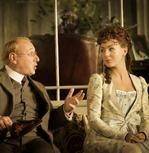SITE GUIDE
SEARCH
REVIEWS
REVIEW ARCHIVES
ADVERTISING AT CURTAINUP
FEATURES
NEWS
Etcetera and
Short Term Listings
LISTINGS
Broadway
Off-Broadway
NYC Restaurants
BOOKS and CDs
OTHER PLACES
Berkshires
London
California
New Jersey
DC
Connecticut
Philadelphia
Elsewhere
QUOTES
TKTS
PLAYWRIGHTS' ALBUMS
LETTERS TO EDITOR
FILM
LINKS
MISCELLANEOUS
Free Updates
Masthead
Writing for Us
A CurtainUp  London Review
London Review
 London Review
London ReviewHedda Gabler
|
Bored . . . Bored. . . Bored.
— Hedda
|

(Photo: Johan Persson) |
Brian Friel has given us a new translation of Hedda Gabler full of anachronisms which sit on the original curiously. The casting of Hedda’s husband is also remarkable with Adrian Scarborough, a splendid comedian, who as George Tesman is thoroughly decent but also bumbling and stupid and anyone can see is no match for the fiery Hedda, daughter of General Gabler. Tesman has no inkling of the repercussions of what he perceives as a very fortunate match, “more than lucky, I’m blessed,” he says naively. Friel also explains the reason why Hedda married Tesman as she talks about growing older and her choices being limited, “things had panned out”, she says.
Anna Mackmin’s production has a silent prologue with the beautiful pale whitewashed set of the Tesman house showing the voile curtains blowing into the room as the Tesmans are expected home from their honeymoon. The room is lit beautifully with the late summer/early Autumn light. Aunt Juliana (Anne Reid) fusses around in a well meaning cameo only to be terribly insulted by Hedda when she is so rude about the aunt’s hat. Sheridan Smith carries off the selfish and cruel statements until in an act of destruction she burns the manuscript that Loevborg (Daniel Lapaine) has lost. Her ambition for her husband’s academic success is what drives her to such an act of destruction, money would have been the only compensation for marrying George and his lack of academic success she finds galling.
Darrell d’Silva is a lecherous, flirtatious Judge Brack soaking up every “soupcon of salacious gossip” and allowing us to see the side of Hedda as she once was in her father’s social set. Daring as she is in her desire to live life like a man, Hedda is essentially conventional as she rejected the advances of both Judge Bract and Eilert Loevberg and worries about scandal. I liked too Fenella Woolgar as Hedda’s friend Thea who we have no doubt will take Hedda’s place, as instead of bringing up Hedda’s child, Thea and George work together on another involvement, recreating the manuscript that Hedda destroyed.
Sheridan Smith’s performance is so subtle yet we feel she knows how horrible she is to the aunt and the maid and this self loathing takes hold resulting in the inevitable conclusion to the play. There is much humour in Friel’s first act but Sheridan Smith rises above this to convince of her own agony beneath the social veneer. As each guest enters, she lines up alongside her husband and places his hand on her shoulder, straight out of a Victorian photographer’s conventional family portrait. Hedda knows how she should appear to the outside world.
Philip Englishby’s music seems a little heavy handed as it intrudes into scenes; at one point I wondered if the music was someone’s mobile ring tone. Hedda Gabler is not my favourite Ibsen play but I am grateful to have seen Sheridan Smith’s tightly drawn complex anti-heroine, smiling her increasingly uncomfortable smiles.
|
Subscribe to our FREE email updates with a note from editor Elyse Sommer about additions to the website -- with main page hot links to the latest features posted at our numerous locations. To subscribe,
E-mail: esommer@curtainup.comesommer@curtainup.com
put SUBSCRIBE CURTAINUP EMAIL UPDATE in the subject line and your full name and email address in the body of the message -- if you can spare a minute, tell us how you came to CurtainUp and from what part of the country. |
| Hedda Gabler
Written by Henrik Ibsen In a new version by Brian Friel Directed by Anna Mackmin Starring: Darrell D’Silva, Daniel Lapaine, Anne Reid, Adrian Scarborough, Sheridan Smith, Fenella Woolgar With: Buffy Davis Designed by Lez Brotherston Lighting: Mark Henderson Sound: Simon Baker Music: Paul Englishby Running time: Two hours 50 minutes with one interval Box Office: 0844 871 7628 Booking to 10th November 2012 Reviewed by Lizzie Loveridge based on 17th September 2012 performance at the Old Vic, Waterloo Road, London SE1 (Rail/Tube:Waterloo) |
|
REVIEW FEEDBACK Highlight one of the responses below and click "copy" or"CTRL+C"
Paste the highlighted text into the subject line (CTRL+ V): Feel free to add detailed comments in the body of the email . . . also the names and emails of any friends to whom you'd like us to forward a copy of this review. |




